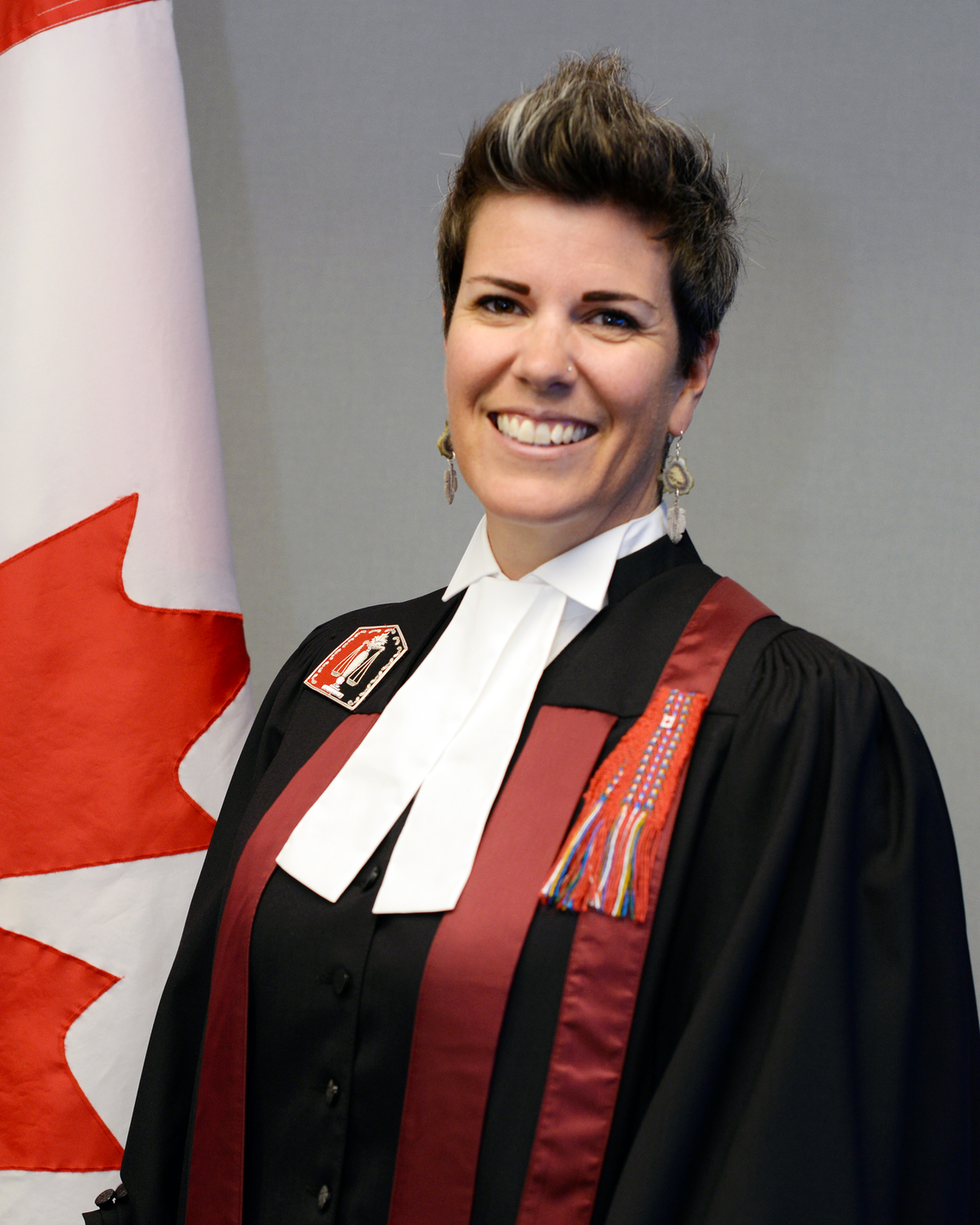
June 14, 2022
Canada’s first Indigenous citizenship judge uses ‘best job in the world’ to champion Indigenous issues
With the Canadian flag, a portrait of the Queen, and a bright orange “Every Child Matters” T-shirt in her Zoom background, Suzanne Carrière, LLB’03, gets emotional when she talks about her work as a citizenship judge with Immigration, Refugees and Citizenship Canada.
“I still choke up sometimes delivering my speech, no matter if the ceremony is on Zoom or in-person, because you can see in the participants’ faces that the moment is so meaningful for them," she says. "You can see some of them crying, hugging their children, and you can see that they’re thinking about their journey. It’s so special and a constant reminder of how lucky and privileged we are to be Canadian.”

Suzanne Carrière, LLB'03, is Canada's first Indigenous citizenship judge.
Since being appointed in 2018 as Canada’s first Indigenous citizenship judge — Carrière is Red River Métis from Manitoba — she has presided over more than 1,300 ceremonies and has sworn in more than 65,000 new Canadians. She also presided the first virtual oath-taking in Canadian history when the COVID-19 pandemic shut down in-person ceremonies, and, in June 2021, Carrière presided over the first ceremony in the country using a revised Oath of Citizenship recognizing the rights of First Nations, Inuit and Métis peoples, a moment she considers a career highlight.
Growing up, Carrière never had any intention to pursue law. She studied Indigenous issues, criminology and psychology in her undergraduate studies at the University of Manitoba. While completing a field course on alternative justice initiatives in Indigenous communities, her supervisor asked her about her plans for her future. After telling him she was contemplating doing a master's in criminology, he encouraged her to pursue a law degree.
When she questioned him about it, he said to her, “Anything you can do with a master's degree, you can do with a law degree. You’re a woman, you’re bilingual and you’re Métis — with a law degree, there’s nothing you can’t do.”
“And that made sense to me," Carrière says. "And he was right.”
Hearing stories from 200 Indian residential school survivors
After graduating from UCalgary Law, Carrière worked for a few years on the legal team at WestJet, but ultimately knew corporate law wasn’t what she wanted to do. When she eventually moved back to Manitoba to start her family, a friend told her that the federal Department of Justice (DOJ) was hiring lawyers to do work related to Canada's Indian residential school system. It was a no-brainer for Carrière as she knew that this work that would be incredibly fascinating, historic and important. She applied and was hired, and, for five years, she was involved in the Independent Assessment Process to resolve claims of abuse suffered at Indian residential schools.
Through that claimant-centred, non-adversarial process, Carrière estimates she heard approximately 200 first-hand accounts from residential school survivors about the abuse they suffered and how it impacted their lives.
You don’t do that kind of work without it changing you and your life.
As for the conflicted feelings she had at times about representing the Government of Canada in that forum, she says she had to remind herself that it’s important to have Indigenous people in all spaces and arenas. “You need people with empathy and compassion doing that work, and it was a real honour for me to be there and to bear witness on behalf of the government,” Carrière says.
After the residential school work ended, she stayed with DOJ’s Aboriginal Legal Services team for another three years. However, she no longer felt fulfilled by the work she was doing. A friend showed her a posting for a citizenship judge and suggested she apply.
Still a champion of Indigenous issues
“I had some hesitation about leaving the Department of Justice to become a citizenship judge because my passion had always Indigenous issues and Indigenous culture. But I knew I was no longer happy at DOJ," Carrière says. "Thankfully, I got the appointment, and the biggest surprise has been how there is still room within my role as a citizenship judge to champion Indigenous issues in my own small way.”
Each June, Canadians commemorate National Indigenous History Month to recognize the rich history, heritage, resilience and diversity of First Nations, Inuit and Métis peoples across Canada.
Indigenous Peoples are the first peoples of this land. They were here since time immemorial, and ultimately, Indigenous history is Canadian history.
“At the same time, it’s not just history. Indigenous People are still here and they’re still contributing to our society. It’s important to celebrate the beauty of Indigenous Peoples, cultures and languages — and the contributions, heritage and the unique stories that we gain from Indigenous people so that we can all move forward together with better understanding, compassion and relationships.
“I have a bit of a platform as a citizenship judge. I can talk about my Métis heritage, reconciliation and how that fits in with newcomers to Canada. I’m talking about these important issues more, meeting more Indigenous people and I feel like I’m making more of a difference now, with a different, and very receptive, audience. It’s been an incredible four years so far, and I truly feel I have the best job in the world!”
ii’ taa’poh’to’p, the University of Calgary’s Indigenous Strategy, is a commitment to deep evolutionary transformation by reimagining ways of knowing, doing, connecting and being. Walking parallel paths together, “in a good way,” UCalgary is moving toward genuine reconciliation and Indigenization.
Learn more about National Indigenous History Month on the Government of Canada's website.





